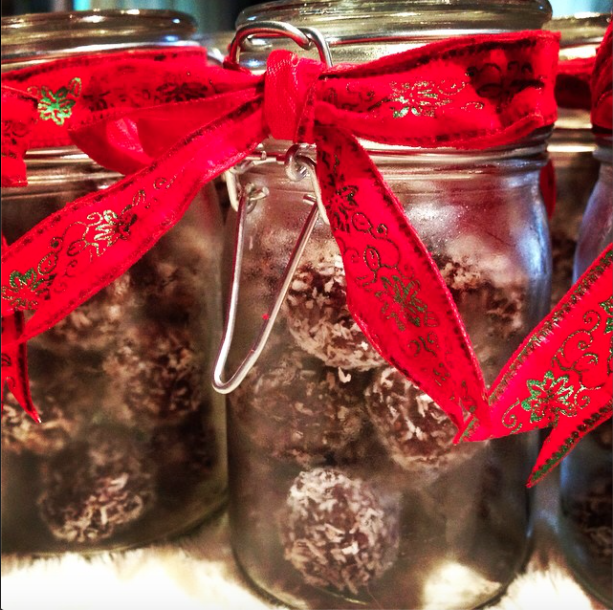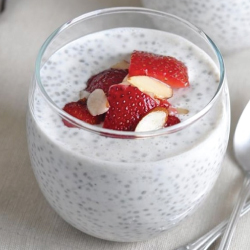The idea of a healthy Christmas sounds almost depressing, doesn’t it? But it doesn’t have to be that way. Over the last few weeks the ‘prevent holiday weight gain’ or ‘how survive Christmas’ articles have started appearing on my newsfeed and in my inbox. Tips like ‘choose low calorie dips and vege sticks for nibbles’, ‘choose fruit based desserts instead of other options’, ‘choose mineral water instead of champagne’, ‘restrict yourself to a certain number of canapés’, ‘decide to have entrée or dessert, not both’.
Sound familiar?
Seeing through the healthy Christmas help and hindrance
There is nothing wrong with these tips, they can all be good way to eat fewer sometimes foods. But do you notice that they make it sound like all there is to making a healthier choice is 1. Knowing what the better option is 2. Making sure said healthier option is available. Don’t forget to toss in enough willpower to match!
And there lies the problem. Healthy Christmas eating is not just about willpower or nutritional knowledge.
There is so much more to our decisions about food than what we ‘know’ we ‘should’ do, especially at Christmas.
I love food. I love cooking, entertaining and sharing special meals with those I love, so I just love Christmas. I am certainly not going to be the Grinch who suggests you only eat carrot sticks while watching others enjoy smoked salmon and prawns, or drink mineral water instead of champagne. I don’t think we need a Grinch at all.
We should take a bigger view. We will be better off approaching this season with joy, balance and mindfulness, not with food rules and restrictions.
When people try to control their food intake with diet rules, often they feel like they are ‘missing out’ on really experiencing Christmas. Or they feel guilty when they (inevitably) break the rules. At the other extreme, at Christmas especially, people can switch off entirely and indulge to excess, day after day. I believe there is a middle ground, I know there is a better way.
It starts with how you think
What sort of language do you use about food?
Is it the critical, judgmental language of dieting? I shouldn’t, I’m so bad, this is so naughty, I better not, I did it again, I told myself I wouldn’t, I am terrible…
The critical language of dieting sets us up for failure. Studies have shown that dieters are more susceptible to food marketing, to being upsized and for dieters, or controlled eaters, a small indulgence is more likely to lead to a binge than it does for a mindful or intuitive eater. Telling yourself you can’t or shouldn’t have something, only makes you want it more. On top of that, the critical language of dieting makes people feel bad for the choices they made. Regret and food guilt abound, and don’t motivate us to make a better choice the next time. It’s a terrible cycle, and it can certainly take the shine off Christmas.
The alternative is empowering and takes the stress and negativity out of healthy Christmas eating.
Kindness and Mindfulness
The alternative starts with the kind and curious language of mindful eating.
What do I want to eat? Why am I choosing to eat this? Am I hungry? Why did I eat that? Why did I eat that much?
Notice the difference?
Rather than trapping us in a negative cycle, this kind of talk can help us identify when we are eating for reasons other than hunger. This empowers us to make a different choice in the moment, or learn from our choice and make a better one next time if need be.
It helps us tune in to what our body is telling us. It helps us eat until we are satisfied, and give ourselves the opportunity to stop eating when we are not hungry.
Let’s get practical
So with that in mind, let’s get practical. Here are my top tips that can help you make healthy choices over the Christmas season, while still enjoying the special time that it is, no rules, no negative cycle.
1. Ask yourself is it actually special?
Some of the food available at this time of year is amazing. Special food we only have at Christmas, handmade fruit mince pies and shortbread, high quality chocolate, beautiful summer fruits, fresh seafood, lovingly prepared ham. Food that may be out of our usual budget often gets a run over Christmas.
But if you look around the shops, your pantry and table, you may find that while the feel of Christmas is special, a lot of the food is pretty normal. Most is certainly available outside the Christmas season. You’ll also find huge quantities of cheap, highly processed ‘festive foods’ that aren’t even that nice. Unfortunately, we find ourselves eating it anyway, out of habit or without even enjoying it all that much.
2. Think quality, not quantity.
For Example: Unlike beautiful, handmade, crumbly fruit mince pies; mass-produced, palm oil and preservative filled minced pies, really just don’t cut it. They can be chewy, overly salty and leave that awful coated mouth feel, which is really unpleasant if you tune into it. Yet, these have been literally stacked, boxes upon boxes, in my local supermarket since October.
Don’t be sucked in by mass-produced, low quality food, masquerading as a Christmas treat. You are much better off choosing to have only the best, and only a little than heaps of a cheap imitation. You are more likely to savor it and thoroughly enjoy it if it is truly special.
I am already looking forward to my first fruit mince tart that I will have this weekend as we put up the Christmas tree, and another on Christmas eve as we open our family presents. I know I will enjoy them more than I would enjoy 6 or 12 mass-produced, long shelf-life pies! Find what you truly love, then savor it. If chocolate is your thing, plan for a little, high-quality chocolate after dinner, rather than handfuls upon handfuls of cheap choc-coated raisins and peanuts.
Often we are enjoying the nostalgic, Christmassy feeling of those foods, rather than the foods themselves. If you are going to eat it, you should make sure you really do enjoy it.
3. Plan well
Are you a member of OA? Over-caterers Anonymous. You know who you are. I saw you at the meeting last year as I was there too. over-catering helps derail your healthy Christmas plans.
But it doesn’t have to.
I am amazed at how much extra food my local supermarket seems to have crammed in at this time of year. Are we actually all hungrier? Probably not. Do our bodies need extra food at this time of year for some reason? Probably not. Sure, some people have a more active lifestyle during holidays but plenty don’t, yet it seems that food consumption skyrockets.
We need to be a little bit careful with our planning. Otherwise, we are likely to buy more than we need and eat a lot more than our body needs. You may need to simplify each occasion, especially if you are attending multiple engagements. You can be confident that it won’t feel less like Christmas if you decide to skip a side dish or a course this year. Our family has ditched the nibbles for the last few years and the only thing really missing, was feeling disappointed that we were already so full we couldn’t fit in the main course.
4. Stop with the ‘just in case’
Throwing a bag of chips, tin of shortbread or packet of chocolate in the trolley to have ‘just in case’ is a classic trap at this time of year. Plan the meals and snacks, write a list and stick to it. Online shopping may help you stay the course with a healthy Christmas.
There is lots of entertaining, there are lots of occasions to indulge in foods that can only make up a small part of a healthy diet. Many of us end up with just way too much food in our houses at this time of year. I love to cook up some leftover ham on boxing day, as much as the next person, but, if we also have huge quantities of other party food filling our fridge and pantry then we will either waste it or consume it. Stop the waste before it gets home, take away the pressure to consume to excess. By not giving food as gifts you will also be helping those around you make healthier choices.
5. Remember, it’s your body so it’s your decision.
There can be so much pressure on people to eat certain foods at Christmas. But it is your body, and you get to decide how you feed it. Don’t let marketing companies, supermarkets or anyone else, dictate what you put into your body. Despite advertisements to the contrary, you do not miss out on the ‘magic of Christmas’ if you don’t eat a certain food.
Don’t like Christmas pudding? Don’t feel pressured to eat it.
Don’t like fruit mince tarts? (surely not!), don’t have one.
Feeling full and don’t want any more food? Don’t let anyone guilt you with a ‘but it’s Christmas’, or ‘but I made it especially’.
There is plenty of other food and Christmassy experiences around, you aren’t missing out by letting the plate pass you by.
If this is something you struggle with, you might like to read my previous blog on this topic.
6. Sit down, take a breath and really enjoy your food.
Sitting to eat, whenever possible, is a great way to help you tune into eating. Taking a breath helps you relax into eating and helps you focus on what you are eating. It can help you tune into all your senses. Smell it, taste it, feel the textures, taste the saltiness, the sweet. Take care to notice what it is you like about it, and importantly, if there are things that you don’t like about what you are eating, this can help stop you from overeating. Tuning into eating can help you notice when you have had enough and help you to stop when you are happily satisfied, before you become overly full. Don’t rush it. There is so much food around, you are not going to miss out!
So my top tips may look a little different to those on my Facebook newsfeed.
Not designed to teach you the best nutritional choice, which I think you probably already know, not setting some rules for you to follow. My tips are about changing your thinking and listening to your body as you plan, prepare, shop and celebrate.
It is my hope that they empower you to make better choices no matter the situation or environment. That they promote mindfulness and help you to shun unhelpful and unnecessary food anxiety or guilt.
I am sure that they lead to a more relaxed, happier, more enjoyable and healthy Christmas than rules or restrictions ever will.
Have a great, happy and healthy Christmas from everyone here at Body Beyond Birth!
Guest Blogger: Meg McClintock is not only the Founder and Principle Dietition of Australian practice Choose Nutrition, she is also the Consultant Dietition for Body Beyond Birth. Find out more about Meg and her nutritional advice within the Body Beyond Birth program on our website and be sure to read more of Meg’s articles on the Choose Nutrition blog and Facebook Page.










